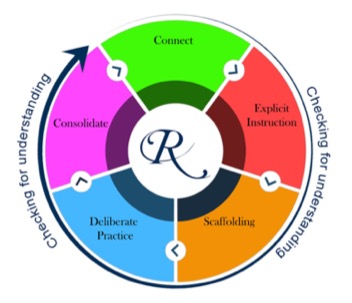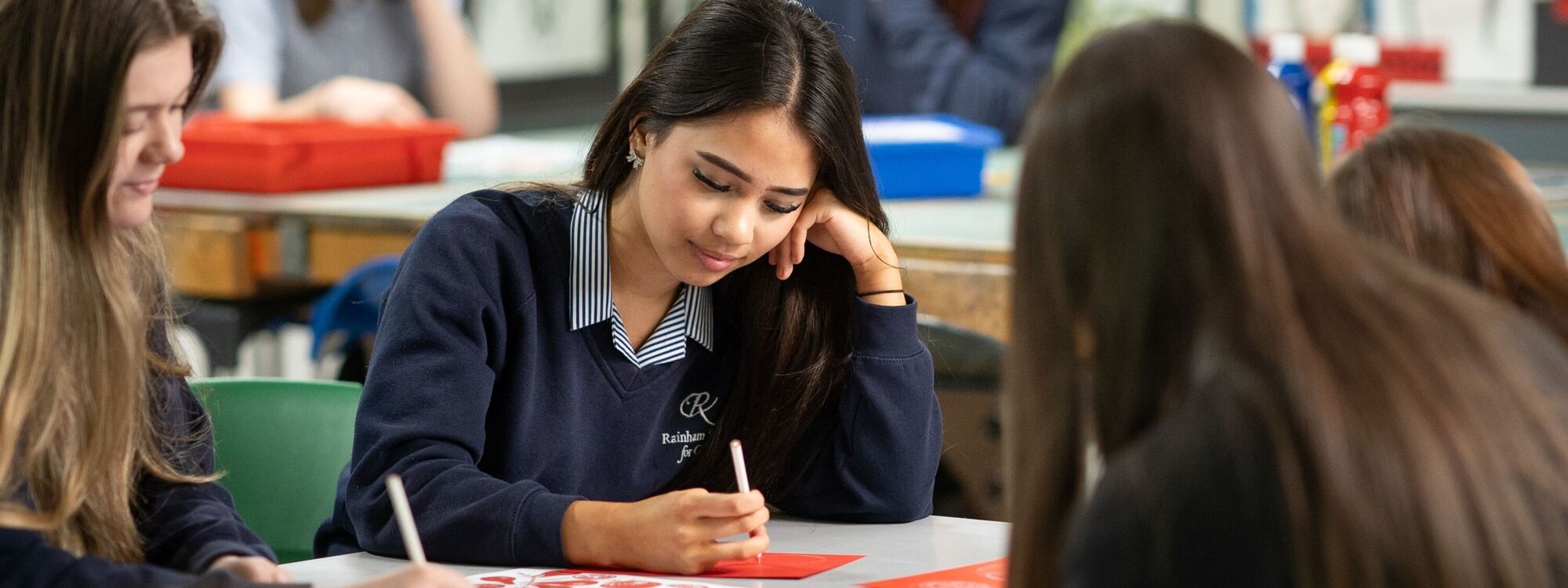- Home
- Our Learning
- Curriculum Overview
- Curriculum Implementation
Curriculum Implementation

Our Curriculum-Centred Pedagogical Model is the vehicle for delivering our progressive curriculum. The Big Question sits at the heart of this and is our key method of promoting curiosity and encouraging conceptual thinking.
It enables pupils to address key concepts and make links between knowledge and ideas over time, developing a broader understanding and providing a wider context to learning. This equips students with the understanding and expertise they need in order to take the next step in their education and future employment.
Teaching and Learning at RSG is characterised by lively discussion, engaging and thought-provoking activities and supported by the excellent relationships between staff and students.
In every learning sequence, we provide students with opportunities to apply their knowledge and skills by working independently or collaboratively and we regularly assess and review what our students have remembered and understood. The information learnt from assessments is then used by teachers to plan the next sequence of lessons and the cycle of learning continues.
Our curriculum has been carefully planned, with identified core knowledge at the heart of each topic. Twinned with the explicit teaching of techniques, students are able to demonstrate the best of what they know and understand. Regular retrieval activities through ‘Do Nows’ at the start of lessons and quizzing supports students with committing their learning to memory as well as through consolidation activities set for homework.
We have high expectations of every student and vary the level of challenge and support to ensure every child is encouraged to do their best. Where a student might have misunderstood a concept or be struggling to apply a skill, our teachers provide additional support in a variety of ways to help them make progress in line with their potential.
Learning in Year 7, 8 and 9 is colourful, innovative and challenging and is supported by our broad and exciting curriculum with opportunities for cross-curricular learning.
Our core value of aspiration is central to the work that takes place in the classroom. We liaise closely with our Key Stage 2 partners in the local community to build upon the knowledge and skills targeted in primary schools to ensure that the offer for our students is appropriate and forward-thinking.
Our curriculum, with The Big Question at its heart, supports the aims, ethos and values of the school by:
- promoting the intellectual, aesthetic, moral, physical and social development of all students
- providing opportunities for the creative and performing arts to make a contribution to the education of young people
- ensuring that equality of opportunity in access to the curriculum is an entitlement
- ensuring that extra-curricular activities, play an important part in school life
- providing students with every opportunity to be happy and successful learners
The school provides a broad, balanced and innovative curriculum with a firm focus on Mathematics, English and Science for all students. To stretch our high prior attainers, a more challenging curriculum is offered within our Stellar stream.
Our taught curriculum is delivered through a two week timetable with each day divided into periods of 60 minutes; an additional 20 minutes for registration takes place each morning.
The Stellar groups at Rainham School for Girls are those students who achieve highly in their Key Stage 2 tests and are placed on a specific programme to stretch and challenge them. This is an excellent opportunity for many students to deepen their understanding of topics and develop critical thinking skills.
For students who may need additional support or with identified SEND our teachers are equipped with the skills to adapt learning to meet their needs. Our SEND department also provides specific support programmes tailored to emerging needs.
Our Education for Humanity lessons incorporate PSHE, RSHE, Citizenship and RE to enable students to live healthy, happy lives, tolerant of people in their community and with a sense of British Values. Not only is this taught as a weekly lesson, but workshops take place throughout the year to explore important topics in more depth.
Our key stage 3 curriculum journey continues into Year 9, where students enjoy a challenging and varied programme of study in each of their disciplines, forming cross-curricular links and developing the skills needed for the next stage of their education. Students in all years are encouraged to continue debating, critiquing and challenging through our dialogic teaching model and explore and tackle a wide range of topics, issues and challenges.
The Key Stage 4 curriculum is designed to support the school’s vision of ambition, aspiration and success.
The Big Question remains integral to the Key Stage 4 curriculum and enables pupils to address key concepts and make links between knowledge and ideas over time, developing a broader understanding and providing a wider context to learning.
During Years 10 and 11 the students’ timetables become increasingly personalised and focus on the needs of the individual.
Throughout the options process, students are guided towards choices from a broad range of options that will meet their needs from GCSEs to vocational qualifications. The focus remains on students achieving their potential in Mathematics, English and Science accompanied by a demanding and wide range of subjects for each student.
An example of the Key stage 4 option subjects are:
Art - Fine Art, Art - Graphic Communication, Business, Child Development, Dance, Drama, Enterprise, Media, Food, French, Geography, History, ICT, Music, PE, Photography, Psychology, Sociology, Textiles, Travel and Tourism.
Within the Stellar Key Stage 4 curriculum students will complete the English Baccalaureate. The EBacc is a combination of subjects that encourages breadth and balance that supports most future career routes. The EBacc recognises students’ achievements across a core of selected academic subjects. The focus of the EBacc is to support students maximising their full potential, and putting them in favourable positions when it comes to deciding upon post 16 courses and career aspirations.
The EBacc consists of English, Mathematics, History or Geography, the sciences and a language. All students at Rainham School for Girls who would like to opt for the English Baccalaureate will also have the chance to do so.
The school is ambitious in its desire for opportunity for all and promotes aspiration to all year groups.
On-site specialist staff, careers fairs and an extensive World of Work programme enable students to make informed decisions based upon clear advice. Students are supported through the option process in their year 9 pastoral curriculum.
Students continue to study Education for Humanity and Physical Education to support their own personal development and the opportunities available throughout the broader curriculum further enhance this. Character development in the school is intrinsically linked throughout the curriculum and pastoral work. The values of collaboration, aspiration, respect and empowerment are developed throughout both the pastoral and academic curriculum.
The Key Stage 5 curriculum builds on the aspirational emphasis from the Key Stage 4 curriculum. It incorporates more personalisation and fosters independent learning skills to prepare students for future career pathways.
The Big Question is still at the heart of the Key Stage 5 curriculum enabling students to be both profound and judicious in their learning.
As a non-selective school, we are keen to ensure we offer a truly comprehensive sixth form. The breadth of our curriculum caters for diverse interests and abilities; we offer a variety of A-levels, Applied courses and BTECs providing progression from Key Stage 4.
Subjects offered include:
Art, Biology, Business Studies, Chemistry, Criminology, Dance, Drama, Economics, English Language and Literature, English Literature, Forensics, Geography, Politics, Graphic Communications, Health and Social Care, Human Biology, History, Law, Mathematics, Media Studies, Music, Philosophy and Ethics, Photography, Psychology, Physical Education, Sociology, Textiles and Travel and Tourism.
Students have their own personalised pathways and will study 3 courses, although some students choose to study 4.
At the end of Year 12 students will undertake a week’s work experience to gain valuable employability skills to help prepare them for the transition to university or into the workplace. To ensure our Sixth Formers achieve their potential in their academic study we provide the opportunity for both structured and independent study to help them achieve the highest grades. Those students who did not secure a grade 4 in English and Maths in Key Stage 4 are allocated extra Maths or English GCSE lessons.
Tutor time for Years 12 and 13 focuses strongly on the personal development of our students through the RSHE sessions, University, Apprenticeship and Career sessions and enrichment opportunities, these also embed our CARE values. Opportunities to collaborate and feel empowerment arise when working with younger students through peer support and tuition. Volunteering and taking part in national competitions are also part of the wider sixth form curriculum. Sessions run by external speakers on such topics as CV and Personal Statement writing, Applying to University and various career and apprenticeship sessions support each student on their chosen Post-18 path.
As well as supporting students in their next steps in education or the workplace, we value developing the personal attributes of our sixth formers, as well as their academic abilities.
